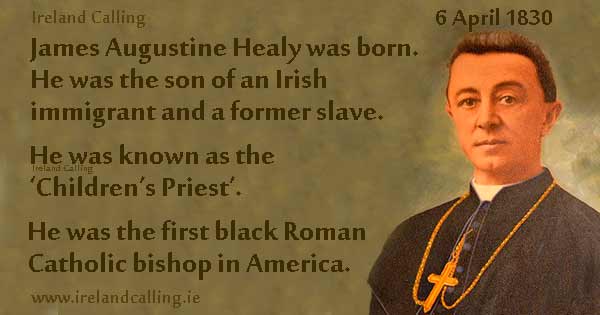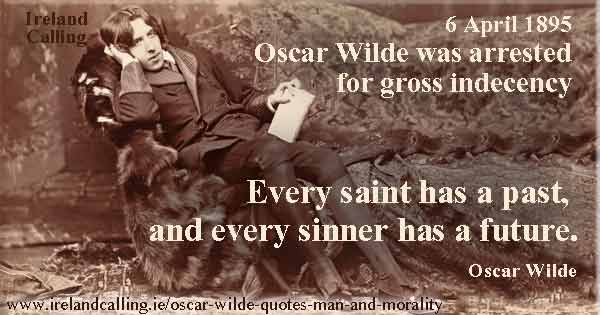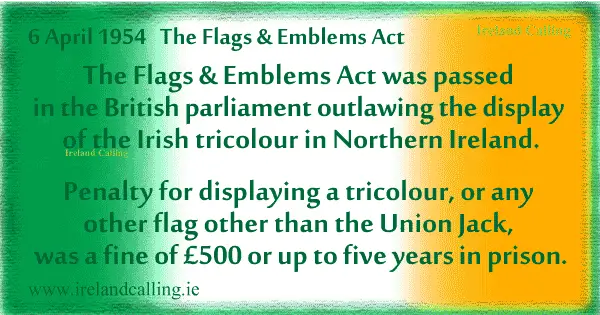april-top.html
1830 On this day in 1830, in Georgia, USA, an Irish immigrant and a former slave had a child, James Augustine Healy. He grew up to become the first black Roman Catholic bishop in America. He was ordained in 1854. He served the diocese of Boston for 21 years.

He was known as the ‘Children’s Priest’. In the snowy, winter, he often let children tie their sledges to his sleigh and gave them rides pulling them along. If some children didn’t have their own sledges – he let them ride in his. He often had a supply of sweets ready to distribute to the children. He bought part of an island near Portland, Maine and he used it to provide a summer holiday home for orphans.
There is an annual Bishop Healy Award ceremony that honours people in Boston who provide help and service to the black Catholic community.
* * *
1895, Oscar Wilde was arrested in London after losing a libel case against John Sholto Douglas (9th Marquess of Queensberry), who had called Wilde a homosexual. (Wilde was having an affair with his son, Lord Alfred “Bosie” Douglas). Wilde, unwisely, sued him for libel, and lost the case. He was sentenced to two years hard labour for gross indecency.

When he was released from prison, he wrote The Ballad of Reading Gaol dedicated to Charles Thomas Woodridge. It was voted Ireland’s 16th favourite poem. Read the poem here
Read Wilde’s quotes on ‘Man and Morality’ here
* * *
1926 The founder and former leader of the Democratic Unionist Party, Ian Paisley was born in County Armagh on this day in 1927. Paisley remained as leader of the DUP, from the 1970s up until 2008.
The party is traditionally made up of Protestants who want Northern Ireland to remain part of Great Britain.

* * *
1954 The Flags & Emblems Act was passed in British parliament on this day in 1954, outlawing the display of the Irish tricolour anywhere in Northern Ireland. The government moved after the flying of flags had been the source of some tensions in Northern Ireland.
Some nationalists had boycotted shops displaying the Union Jack, the British flag, during Queen Elizabeth’s coronation celebrations. In some cases, Union Jacks were removed by nationalists and replaced with the Tricolour. The tension was increased as the Unionists felt that the nationalists were being indulged by the authorities, and not punished or deterred from these acts of hostility.
The Flags & Emblems Act was passed in order to quash any growing unrest among the nationalists in Northern Ireland. Under the law, anyone displaying a tricolour, or any other flag other than the Union Jack, could be charged with breaching the peace and face a fine of £500 or up to five years in prison.
In reality though, the law didn’t change behaviours in Northern Ireland. It was pretty much unenforceable for the police, and very little changed.
 Find out more about the Irish Tricolour
Find out more about the Irish Tricolour
* * *
1971 Happy birthday to Robin Seymour, born in County Wicklow on this day in 1971. He was Ireland’s number one mountain bike racer and represented his country at three Olympics Games in Atlanta 1996, Sydney 2000 and Athens 2004.
* * *
2002 Galway man Richard Donovan made history on this day in 2002. He became the first man to complete the challenge of running a marathon at both the North Pole and South Pole. Donovan is an extreme long distance record breaker.
In 2012, he ran seven marathons on seven continents inside five days. He completed a 26 mile run in each of Antarctica, Cape Town, Sao Paolo, Orlando, London, Hong Kong and Sydney in a time of 4 Days, 22 hours and 3 minutes.
Donovan took on the incredible challenge to raise money and awareness for the Irish humanitarian charity, Goal. Click here to read more about Goal
april-bottom.html